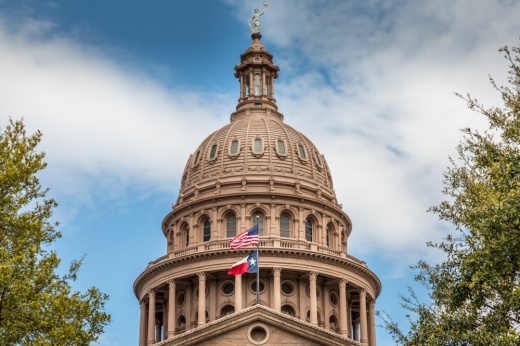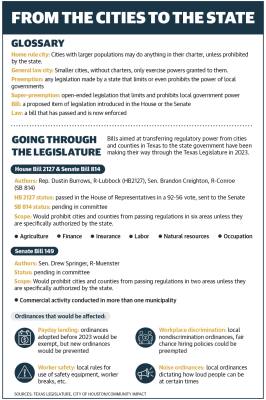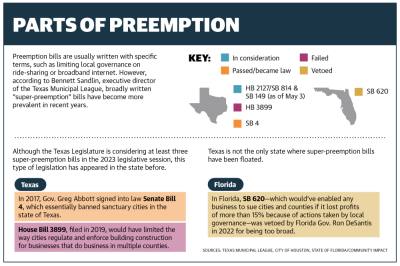Central to the push are a trio of what some experts call “super-preemption” bills making their way through the Legislature: House Bill 2127 and its companion bill Senate Bill 814, as well as SB 149. The phrase “super-preemption” refers to how the bills preempt cities and counties in Texas from adopting their own ordinances, limiting them to only ordinances that are expressly allowed under state law.
Those in support of the bills say they are needed to provide more regulatory consistency for small business owners and people who work in those fields.
“We want those small-business owners creating new jobs and providing for their families, not trying to navigate a byzantine array of local regulations that twist and turn every time,” said state Rep. Dustin Burrows, R-Lubbock and author of HB 2127, at an April 18 hearing on the bill in the Texas House of Representatives.
But opponents of the bills—which include workers’ rights organizations, the Texas Municipal League and the city of Houston—have decried what they said would be a loss of local freedom if the bills pass in their current form. Although the full implications of the bills are still unclear, opponents said regulations at risk range from worker safety to drought restrictions, consumer protections and zoning laws.
Houston officials said the passage of bills like HB 2127 could result in a loss of protections for residents, pointing to past examples of local ordinances being struck down and never replaced at the state level.
“Take concrete batch plants, for example,” said Bill Kelly, director of government relations with Houston Mayor Sylvester Turner’s office. “The Texas Supreme Court struck down Houston’s ordinances, and now we are faced with [a] process where vulnerable neighborhoods in Houston are at risk. The Legislature has passed nothing to protect them.”
Defining preemption
Preemption laws are any bills passed by a large governing body, like the state of Texas, that limit the power of smaller governments, like the city of Houston, under its umbrella.
HB 2127 and SB 149, if passed, would prohibit cities and counties from passing regulations in several key areas unless they are specifically authorized by the state. The codes under HB 2127 and SB 814 include finance, agriculture, labor, and property, among others, while SB 149 deals with commercial activity conducted in more than one city.
“The intent of the legislation is for those areas of the law where the state has dictated the rules, those are what is going to apply and preempt city regulations in those areas,” said Scott Norman, president of the Texas Association of Builders and supporter of the bills. “There are a lot of exceptions. ... Building permitting, platting, things that deal with land, not the workers, those things are left to the cities.”
According to Mark Jones, a political science professor at Rice University, the open-ended language of the bills could lead to problems.
“Unless someone’s done the work of cataloging every kind of responsibility a city or county government engages in, there are going to be some things cities and counties have been doing as part of their normal activities that is not specifically authorized by the state,” he said.
City concerns
Although HB 2127 has gotten the attention of local leaders, there are other bills working through the Legislature that would shift power from the local level to the state, including a batch of bills that provide the state with more power to oversee and intervene in elections at the local level.
The broad and sweeping legislation in HB 2127 would remove power from larger cities, such as Houston, which are currently independently ruled—known as home rule cities—according to Bennett Sandlin, executive director of the Texas Municipal League, which provides legal, legislative and training services to city governments in Texas.
“It would turn home rule cities into general law cities,” Sandlin said. “They’d have to look for specific grants of state law. So it sort of undermines the home rule principle.”
Houston officials said the bills could lead to an uptick in litigation. Collyn Peddie, a senior attorney for the city of Houston, appeared before the Texas Senate Committee on Business and Commerce to denounce SB 814 at a public hearing April 4.
“[SB] 814 will stifle the customized local innovation and tailored services and protections the framers embraced by adopting home rule in the first place. The state could never match the custom efforts—like Houston’s noise ordinance—and Houston businesses and residents suffer,” Peddie said.
An earlier version of the bill would have preempted local regulations for payday and auto-title lending. The bill was amended to allow payday ordinances adopted before 2023 to remain in place, but would still prevent cities from adopting new ordinances.
The bill would also preempt local protections for workers, including those mandating breaks in the heart of summer. This is a concern for Rick Levy, president of the Texas AFL-CIO, a federation of labor unions representing 235,000 members in Texas.
“There’s no question that what [they’re] doing will result in the ordinances in these cities being nullified, and so workers will actually lose the right to have a rest break in the middle of summer,” Levy said.
Path to passage
As of press time May 3, HB 2127 had passed in the Texas House of Representatives and had advanced out of the Senate Business and Commerce Committee. Meanwhile SB 814 and SB 149 were both still pending in committee. The last day of the 2023 legislative session is May 29. Gov. Greg Abbott has come out in support of HB 2127.
Norman said HB 2127 would still leave cities with the ability to regulate themselves in many other areas outside of the targeted ordinances. Worker protections would also still exist under laws enforced by the Occupational Safety and Health Administration, he noted.
However, Hany Khalil, executive director with the Texas Gulf Coast Area Labor Federation, said OSHA is underfunded and cannot be relied on to consistently oversee and enforce protections, which is where local protections can help fill gaps.
Jones said groups opposed to the legislation have two main options: continue fighting to get the bill killed, or accept that it is likely to pass and try to work with lawmakers to change concerning elements.
Key to the conversation moving forward are efforts to allow cities to maintain their individuality based on what makes the most sense for them, Sandlin said.
“Every city is different, and those differences are actually strengths,” he said. “We shouldn’t try to make cities look alike just to supposedly attract more business. Texas is doing just fine attracting business, and it’s because of cities being unique and vibrant.”








